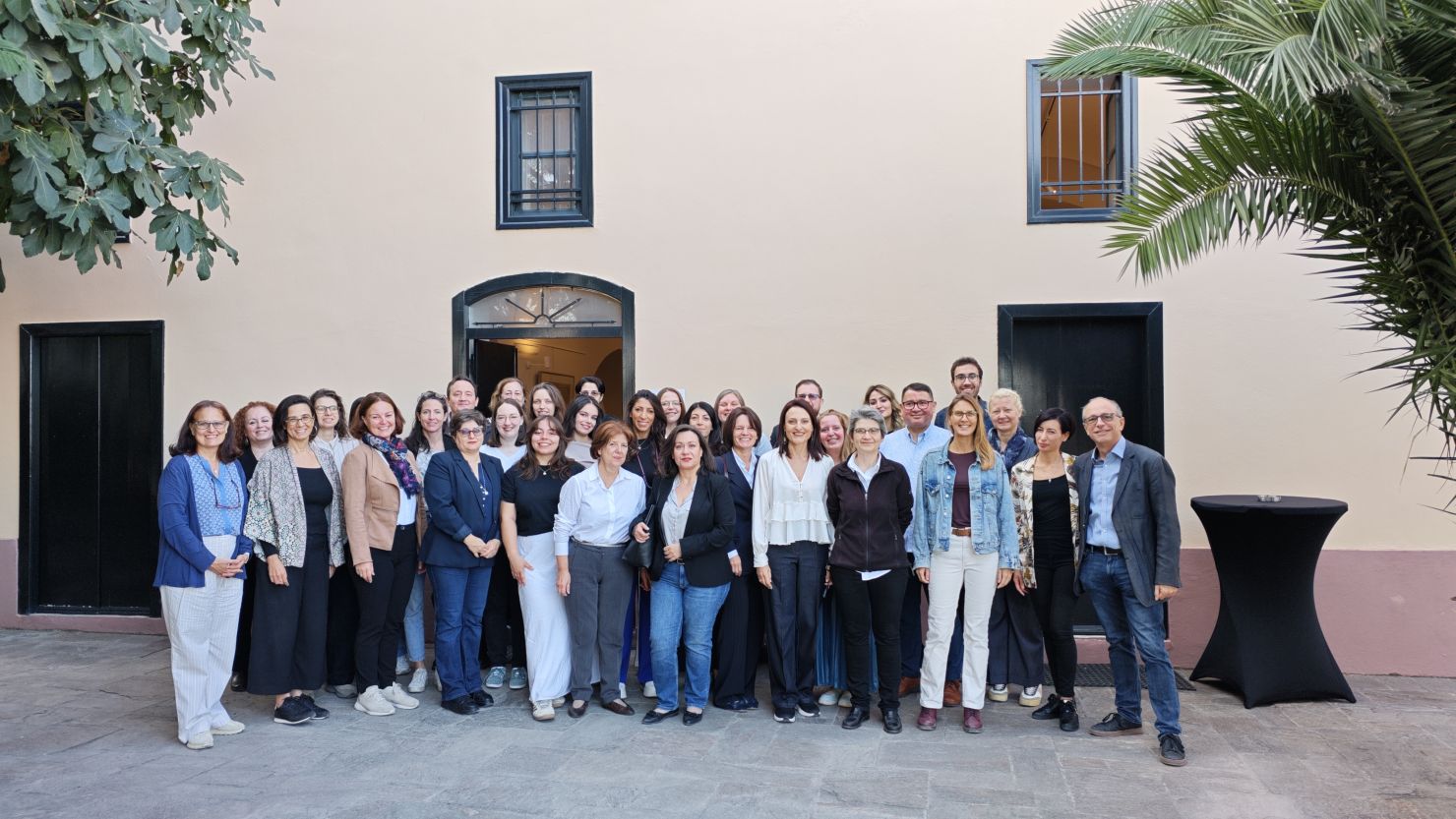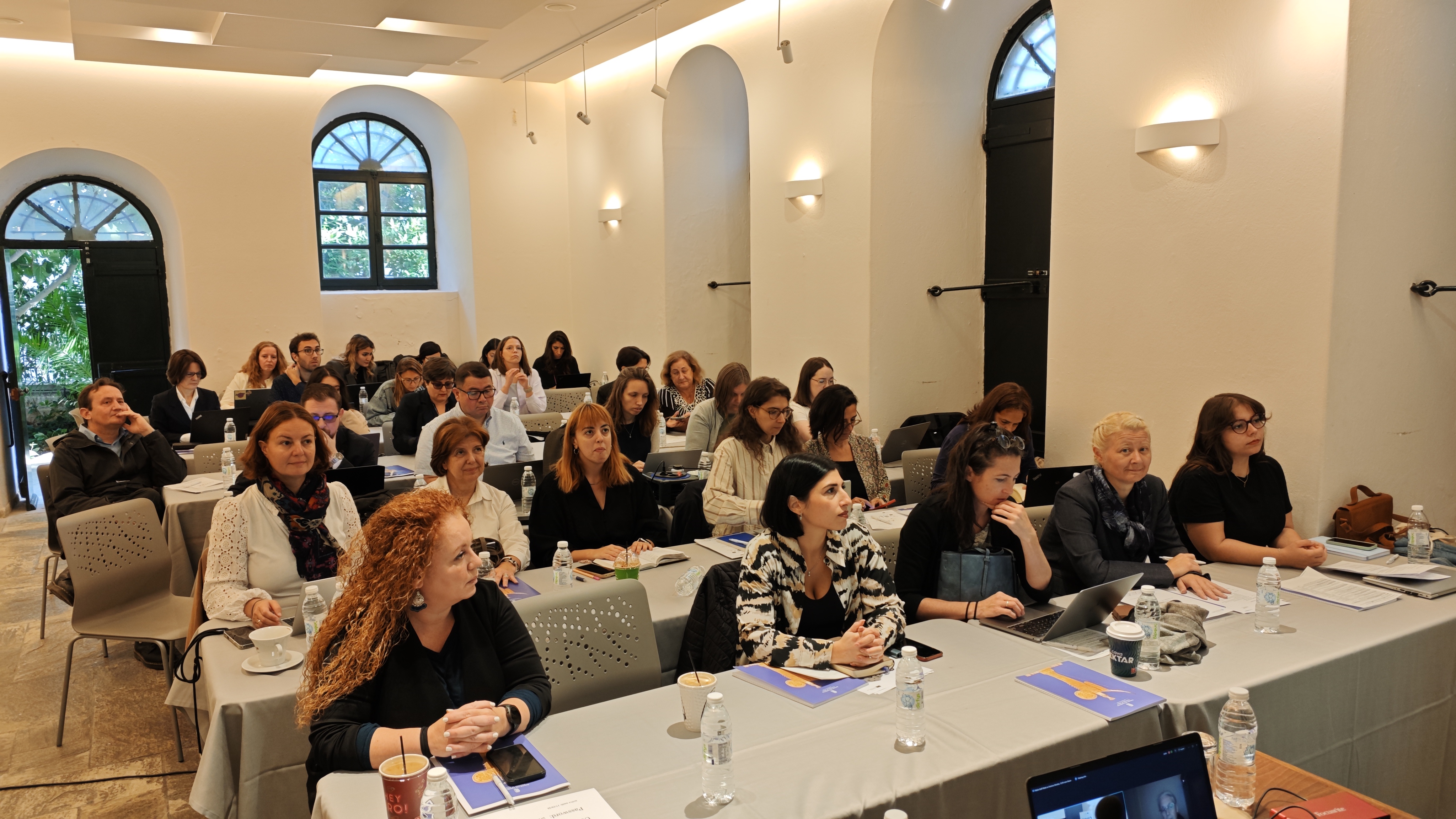Erasmus Mundus Unlocked: Staff Week in Athens Focuses on Sustainable Joint Master’s Programmes

The CIVIS Staff Week, held in Athens from 13–15 October 2025 and hosted by the National and Kapodistrian University of Athens (NKUA), was organized by the WP9 team and the NKUA CIVIS Office. The event, held in the historic NKUA History Museum in Plaka, in the heart of Athens, brought together 40 participants- academics, administrative professionals, and experts in Erasmus Mundus Joint Master’s (EMJM) programme management from all CIVIS partner universities.
Over three days of rich and varied activities, participants explored the concepts, criteria, processes, challenges, and practical strategies for designing sustainable, high-quality joint programmes within the European higher education landscape.
We wanted to create a space where ambition could meet practice – where ideas and experience about joint Master’s programmes become real strategies for long-term sustainability and excellence of our European joint programmes in CIVIS and beyond, explained WP9 Leader Prof. Maria Daskolia (NKUA).
Opening the doors to EMJM excellence
Prof. Sofia Papaioannou, Vice-Rector for Academic Affairs and International Relations, at NKUA, Prof. Maria Daskolia, WP9 Leader, and Ilias Antoniou, CIVIS Institutional Coordinator at NKUA, warmly welcomed participants and outlined the rationale behind the theme and training of the Staff Week, highlighting the significance of its goals, and the practical and collaborative approach at the core of the event. Dr. Antonia Samara (WP9) presented the structure of the programme and set the tone for active participation and reflection.

The sessions began with an introduction to the Checklist for Successful EMJM Applications (SEMJM) by Angela Melley, formerly at the University of Glasgow, offering a practical framework for critical considerations when preparing EMJM proposals.
The checklist is not just a document – it is intended to become a living product of our shared expertise, reflecting everything we learn during this Staff Week about how to make a joint Master’s programme both high-quality and sustainable, commented Angela Melley, also a member of the organising team.
Alexandru Mihai Cartis (University of Bucharest and Head of the CIVIS Education Unit) followed with a comprehensive overview of the current state of EMJM applications across CIVIS, setting the stage for the subsequent presentations, discussions, and workshops. Presentations from Stockholm University and the Universidad Autónoma de Madrid shared lessons learned from the Master's Programme in Transdisciplinary Studies of Climate, Environtment and Energy -TRACEE (Professor Joakim Edsjö, and Sara Laginder) and the Master's programme in South European Studies -EUROSUD (Professor Irene Martìn Cortès, and Sofia Navarro Garcia) programmes, highlighting both successes and challenges and demonstrating the importance of institutional experience and reflective practice in building sustainable joint programmes.
The first session also included presentations on funding opportunities and financial sustainability, led by Christel Dupont Ferrier (Aix-Marseille Université) and Paola Vellani (Université libre de Bruxelles). Workshops and lectures emphasised the need to integrate robust financial planning into EMJM proposals, ensuring programmes can thrive without exclusive reliance on Erasmus Mundus grants. Interactive Q&A segments throughout the day encouraged dialogue between participants and experts, ensuring theory was directly connected to practice.
Hands-on learning and collaborative engagement
Day 2 transitioned into practical workshops and interactive exercises, allowing participants to structure their experience and insights and apply their learning. Parallel workshops included:
- Completing EMJM work packages, facilitated by Christel Dupont Ferrier, focusing on milestones, deliverables, and risk management strategies.
- Designing self-funded editions, guided by Angela Melley and Clare McManus (University of Glasgow), emphasizing strategic design and positioning for sustainable EMJM proposals.
Key takeaways brought to the plenary were consolidated in real-time into the SEMJM Checklist, moderated by Prof. Maria Daskolia and Antonia Samara (WP9). This collaborative approach ensured all participants contributed to a shared, practical tool for future CIVIS joint programme design.
The afternoon sessions focused on project management models across CIVIS institutions, with presentations by experts from Aix-Marseille Université, Université libre de Bruxelles and the University of Glasgow. Participants explored institutional support structures, administrative workflows, and centralized guidance, comparing approaches and identifying best practices for sustainable programme coordination. A dedicated session on renewal and resubmission of EMJM bids highlighted lessons learned from successful applications, offering concrete strategies to improve future proposals.
As Ilias Antoniou, CIVIS Institutional Coordinator at NKUA, highlighted: “Sustainability in CIVIS joint programmes is achieved through strategic planning, practical tools, and the sharing of best practices. CIVIS must focus on aligning vision, resources, and expertise not only to strengthen our existing and approved Joint Master’s Programmes, but also to prepare and support the next generation of CIVIS joint programmes, ensuring their positioning within the rapidly evolving landscape of European higher education policies.”
Aligning with European standards and strategic planning
The final day addressed the broader European context, including the European Degree Label (EDL) and its implications for joint degree recognition. Alexandru Mihai Cartis outlined the evolving European framework, emphasising the need for EMJM programmes to align with both current and forthcoming standards.
Recent developments on the European Degree Label and joint degrees signal a qualitative shift in the dynamics of European Master Programmes. CIVIS Joint Masters have all the prerequisites to be a strong part of this new era in higher education. Providing accurate, up-to-date, and practically oriented knowledge through this Staff Week will enhance their sustainability, international competitiveness, and overall excellence, said Dr. Antonia Samara, member of WP9 and the organising team.
The Staff Week concluded with a panel discussion, bringing together Angela Melley, Christel Dupont Ferrier, Clare McManus, and Sebastian Seiffert (ULB), moderated by Maria Daskolia (WP9 Leader). The panel reflected on lessons learned, explored strategies for structural and financial sustainability, and invited participants to share personal insights and institutional recommendations.

Building shared expertise and a sustainable future
The Staff Week underscored the importance of systematic and informed planning, alongside collaboration, knowledge sharing, and reflective practice, as key drivers for strengthening the sustainability of CIVIS Joint Master’s Programmes. It also succeeded in broadening participants’ understanding of what sustainability means in the context of educational programmes:
“Sustainability is about more than funding; it’s about structure, trust, and a shared vision,” reflected one participant. “This Staff Week brought that vision to life.”
Participants reported significant gains in understanding EMJM processes: 56.5% indicated limited prior knowledge, while 69.5% described their knowledge as high or very high after the training. Feedback emphasized the value of sharing practical experiences, developing common tools like the SEMJM Checklist, and fostering networks of expertise across the CIVIS alliance.
“This week reminded us that European joint programmes’ sustainability is not just about securing monetary resources. It’s about relationships, collaboration, and a shared belief in the value of European education”, reflected another participant.
Looking forward
The three-day Staff Week in Athens successfully combined theoretical insights, practical exercises, and collaborative reflection. It demonstrated that structural coherence, financial planning, and shared expertise are essential for sustaining high-quality EMJM programmes. By engaging both academics and administrative professionals, the event fostered a culture of collaboration and collective responsibility, laying a solid foundation for future CIVIS initiatives.
"As CIVIS continues to expand its network of Joint Master’s Programmes, the knowledge and tools shared, insights developed, and experiences and best practices presented during this Staff Week will serve as valuable resources, ensuring that the alliance is even better equipped to design, implement, and sustain joint educational offerings that are both academically excellent and strategically aligned with the evolving European higher education landscape," commented Prof. Maria Daskolia (WP9 Leader) during the closing of the Staff Week.
Photo credits: NKUA
